
Removing Noise From Music Using Adobe Audition Reviewing All Possibilities

Removing Noise From Music Using Adobe Audition: Reviewing All Possibilities
With the invention of advanced editing software, the demands of content creation increased. Content creators outrun many challenges to create captivating content. One of these challenges is the maintenance of audio quality. Sometimes, singing a microphone is not enough, so post-creation methods do the trick. One of the ways of doing this is through Adobe Audition noise reduction.
There are multiple things to consider during audio editing at a professional level. For instance, microphone noise, humming, wind, hiss removal, and others. Adobe Audition removes background noises and nuisances that decline audio quality. In this article, you can read about Adobe Audition remove noise methods. In addition, some other tools are discussed for users’ ease and accessibility.
AI Noise Reduction A cross-platform for facilitating your video editing process by offering valuable benefits!
Free Download Free Download Learn More
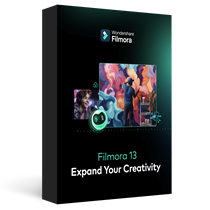
Part 1: What Do You Know About Background Noise?
Background noise is anything that disturbs the pace of the video and diverts the viewer’s attention. It is the unwanted and unintended sound that takes up your audio. This may include someone chatting in the background, wind noise, and other noises. These factors decline and disrupt the clarity of audio. However, these elements can be managed through various tools and techniques to help creators.
Part 2: How to Remove Noise from Adobe Audition: A Comprehensive Review
Adobe Audition is a tool tailored to assist in audio editing tasks with precision. Users can create, merge, and mix different sound effects and be creative with them. It also has seamless support of Adobe After Effects and Adobe Stock for this purpose. Noise reduction Audition is one of its features that helps in cleaning and enhancing audio. It clears out any unnecessary background noises from any project.
In addition, the tool allows you to manage the audio levels for denoising. Along with manual settings, you can also add denoise effects to reduce background effects. You can manage high and low frequencies in Adobe Audition to remove noise. Upon editing this software, you can review the results afterward.
Different Methods of Audio Reduction in Adobe Audition
As a content creator, you must often manage dialogues and music within a video. Combining both can sometimes get the focus off actual dialogues. This can be due to many reasons; however, the solution is noise reduction in Audition. In this section, you can explore different methods to reduce noise:
1. Noise Reduction Effect
In this section, we are doing a noise reduction Audition manually. The process is straightforward, and here is a step-by-step guide to it:
Step 1: Upon importing your audio in Adobe Audition, navigate towards the top toolbar. Select the “Effects” tab and choose “Noise Reduction/Restoration” from the dropdown menu. As the menu expands further, select “Noise Reduction.”
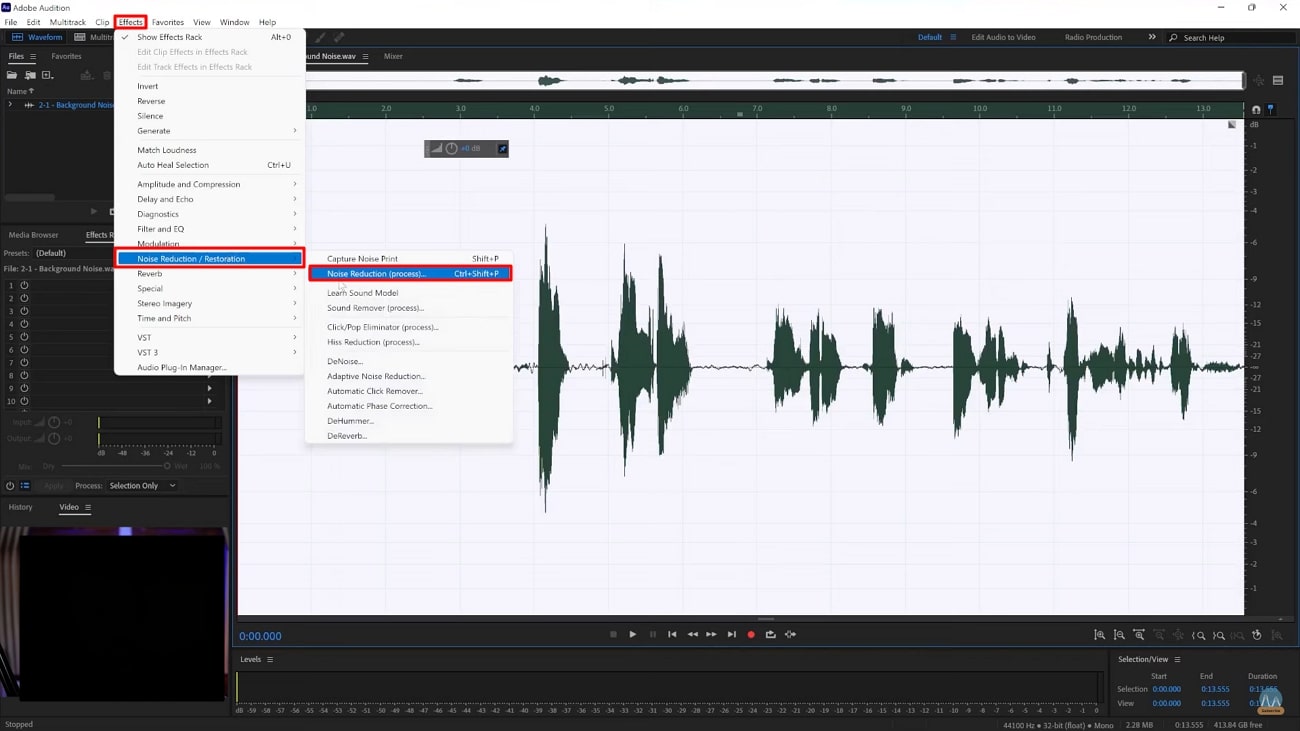
Step 2: This will feature a Noise Reduction window on your screen. In this window, select the “Capture Noise Print” tab and adjust the Noise Reduction slider. Afterwards, press the play button on this window to listen to the audio and select “Apply.”
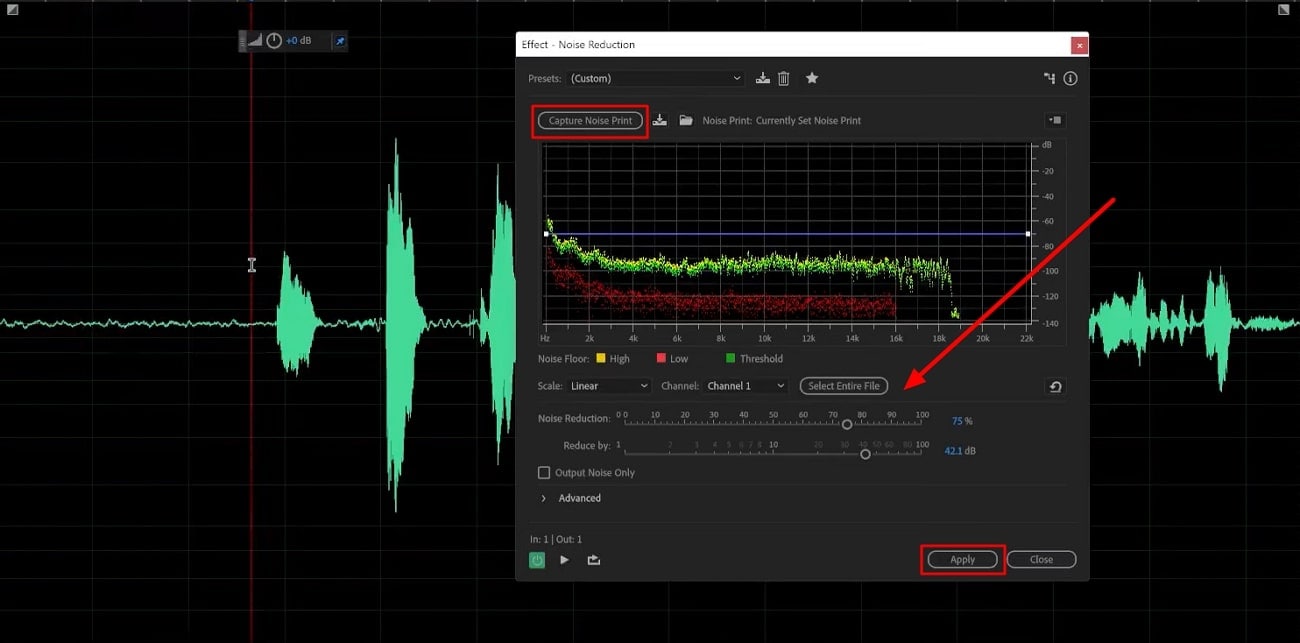
2. DeNoise Effect
This is the second method of Adobe Audition to remove noise. Accessing this option is almost the same, but settings may vary. Here is an instruction manual on how you can denoise in Audition:
Step 1: Once you have imported media into the timeline, reach the upper toolbar. Look for the “Effects” tab and proceed to the “Noise Reduction/Restoration” settings. From the expansion panel, choose the “DeNoise” option.
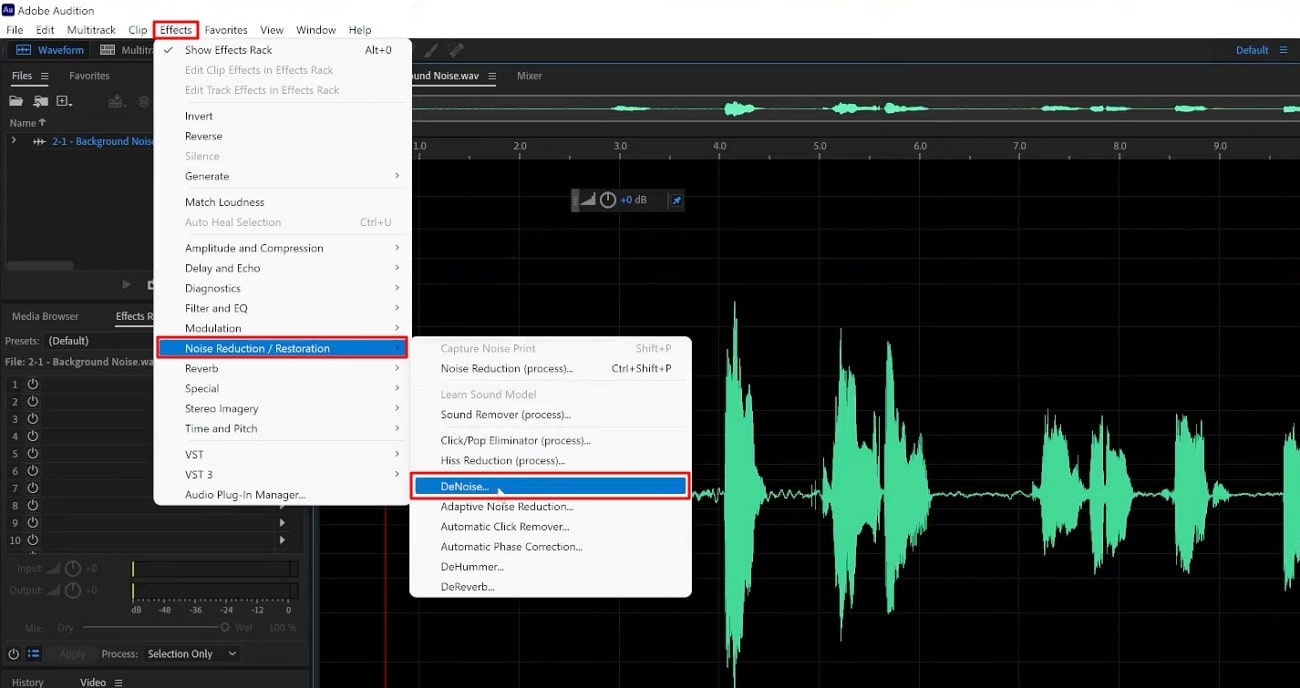
Step 2: After accessing the DeNoise window appearing on the screen, direct towards it. Then, change the position of the “Amount” slider and play your audio. Further, select the “Apply” button to add this effect to your audio.
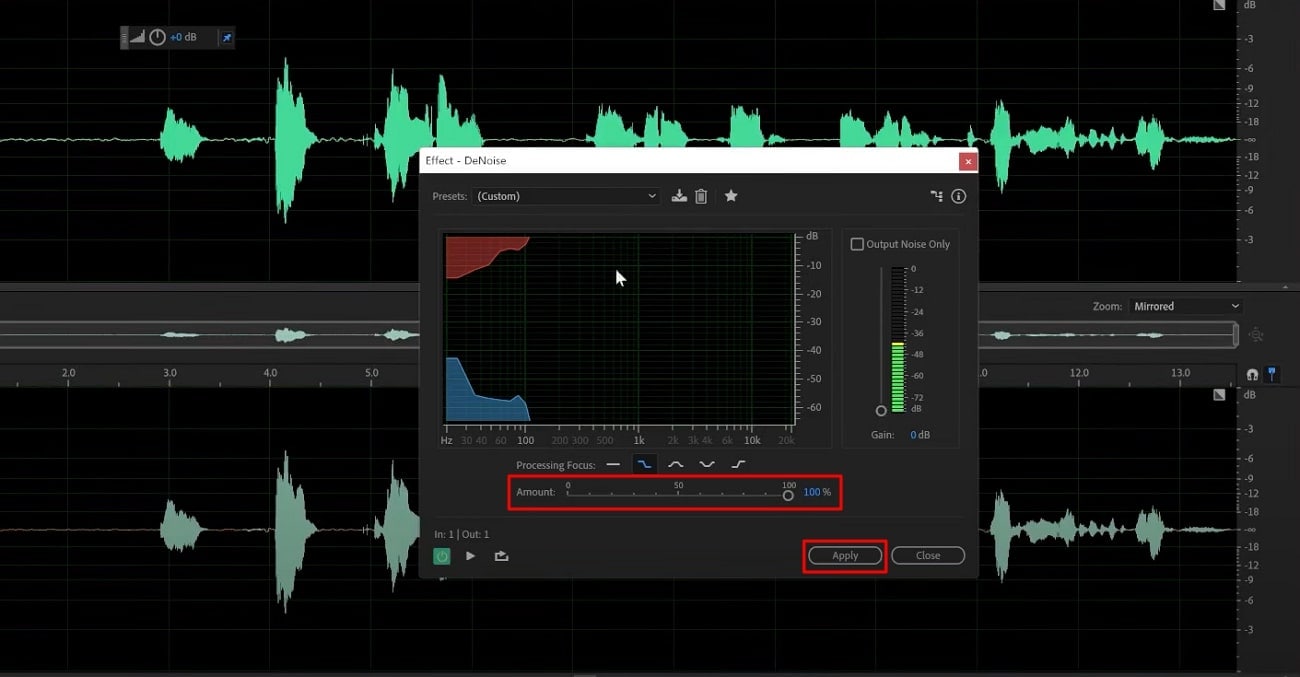
3. Dynamic Effect
Another audio effect that you can apply and adjust in the same manner is the dynamic effect. Follow the steps given below to achieve this effect:
Step 1: After selecting the “Audio” tab, choose “Amplitude and Compression” from the dropdown menu. Expand this option and select “Dynamics” from the expansion menu.
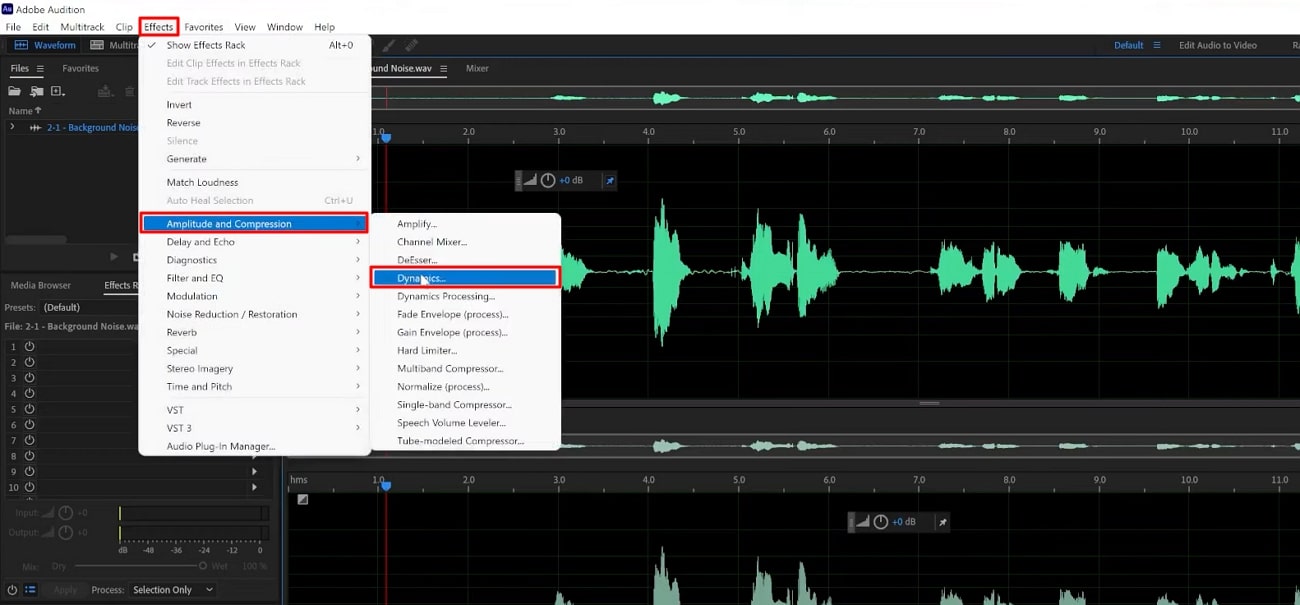
Step 2: From the Dynamics window, expand the “Preset” option and set it to “Default.” Further, activate the “AutoGate” option and change the “Threshold” value. Then, click “Apply” to save and apply these settings.
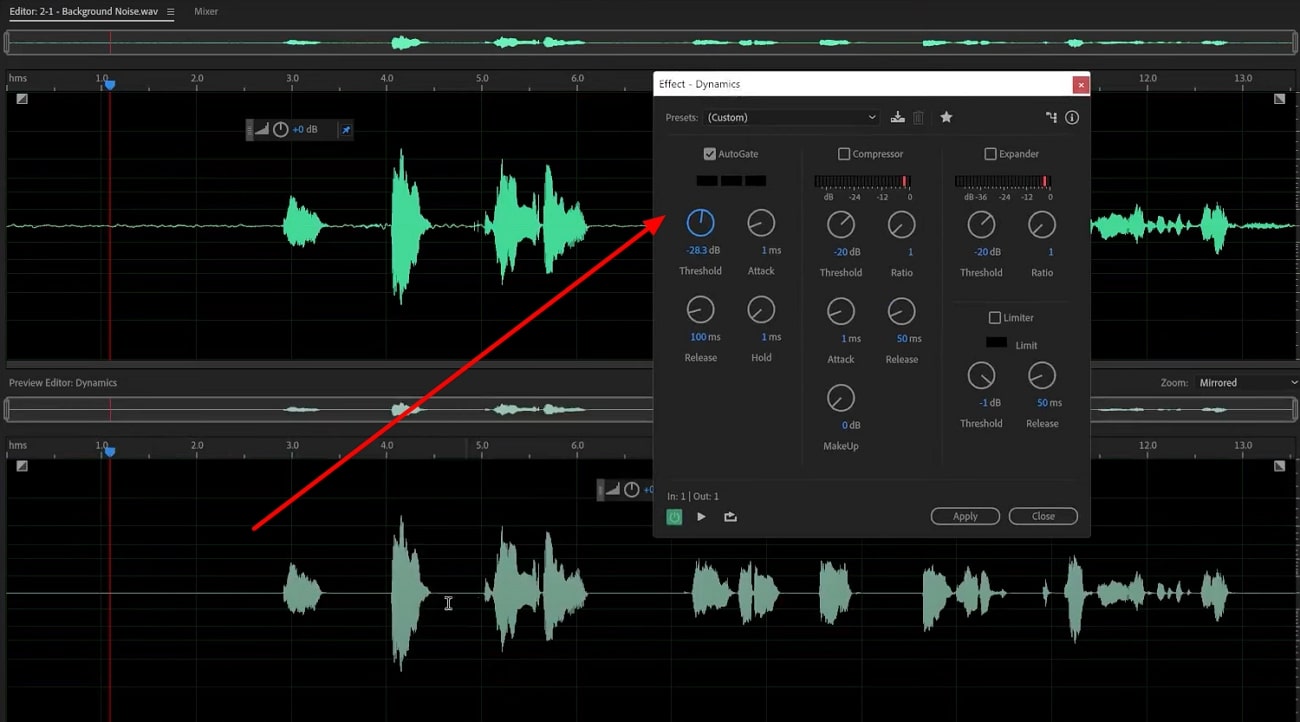
Part 3: Other Solutions That Can Be Tried to Remove Noise from Videos
Since Adobe Audition remove noise has a professional interface, it might trouble some of you. The settings can be challenging to apply, so this section is all about alternatives. In this section, you can find the online solutions for noise reduction below:
1. Flixier
With this online Adobe Audition remove noise alternative, you can remove background noise. Users simply need to upload a video and activate the enhanced audio option. The audio enhancer eliminates unnecessary sound, giving it a name and description. It is compatible with popular and worldwide media formats like WAV, MP3, etc. Moreover, you can share the video straight to social platforms.

Key Features
- Offers an Improve Quality feature to clear up and enhance speech.
- Users can edit audio after denoising, and you can access its audio library to apply effects.
- Users can detach audio from the clip or fade in and out the audio effects to align with the video.
2. MyEdit
Are you looking for an online AI alternative to Adobe Audition noise reduction? This is a versatile platform for removing unwanted audio from up to 100 MB file size. It can denoise a 10 minutes file of formats like MP3, MP4, WAV, and FLAC. It enhances quality through audio denoise, wind remover, and speech enhancement. It uses AI technology to auto-remove background noise and enables a preview.
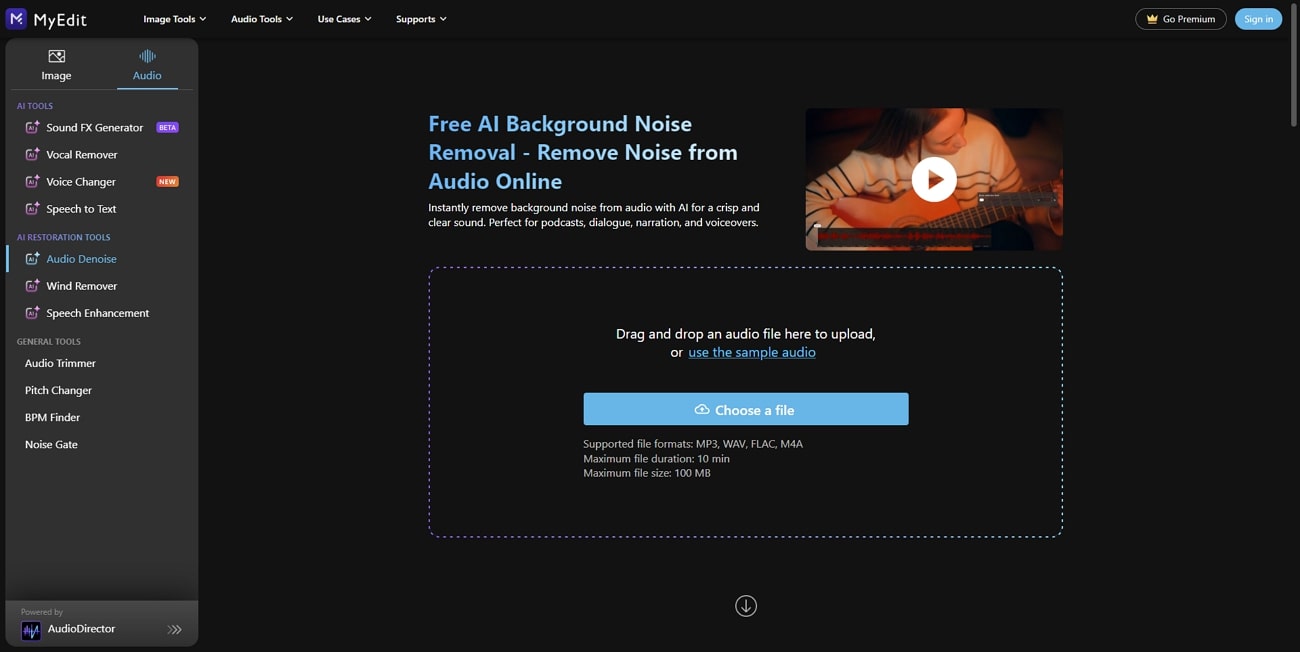
Key Features
- Users can employ its Vocal Remover to create clear and high-quality voiceovers.
- The user interface is a simple upload-to-convert process and doesn’t take up any storage.
- The AI helps accelerate the denoise process and retains audio quality.
3. KwiCut
Utilize this web-based Adobe Audition remove noise alternative to eliminate background noises. It can remove anything that declines an audio quality, like hums, hisses, and more. It removes any distractions in the background that decline communication. The AI assists in enhancing speech to maintain the professional element in the continent.

Key Features
- The tool supports a range of audio and video formats like MP3, MOV, WAV, and more.
- It supports text-based audio editing to edit audio or remove secondary noises.
- To create effective voiceovers for videos, use KwiCut’s voice cloning feature.
Part 4: Wondershare Filmora: A Unique Solution to Reducing Noise in Video and Audio Content
In contrast to all these Adobe Audition noise reduction alternatives, here is another. Wondershare Filmora is a wide platform for video, audio, and visual editing. The tool allows users to use manual and AI features to enhance content. In addition, Filmora introduced its V13 upgrade with new AI features. Amongst them is the AI Vocal Remover tool that separates vocals from background noise.
Using this tool can help you embed vocals in video tutorials or vlogs. In addition, Filmora also offers an Audio Denoise feature to remove distracting noises and voices. Users can enhance speech by removing wind noise, humming, and hissing. In addition, you can take Filmora’s Denoise AI’s assistance to do this.
Steps for Filmora AI Audio Denoise
If you wish to employ Filmora’s denoise feature, you are at the right place. This tool enables AI Speech Enhancement and Wind Removal with a denoise option. In addition, it has DeReverb, Hum Removal, and Hiss Removal. Users can manually adjust the value of this slider to set audio preferences. By following this step-by-step guide, users can remove background noises from video:
Free Download For Win 7 or later(64-bit)
Free Download For macOS 10.14 or later
Step 1: Initiate Filmora and Import Media to Timeline
First, download this AI software on your device and launch it. After logging in, locate and hit the “New Project” option and enter its editing interface. Afterward, click the “Ctrl + I” keys and choose files from your device. Once the files are imported, drag and place them in the timeline.
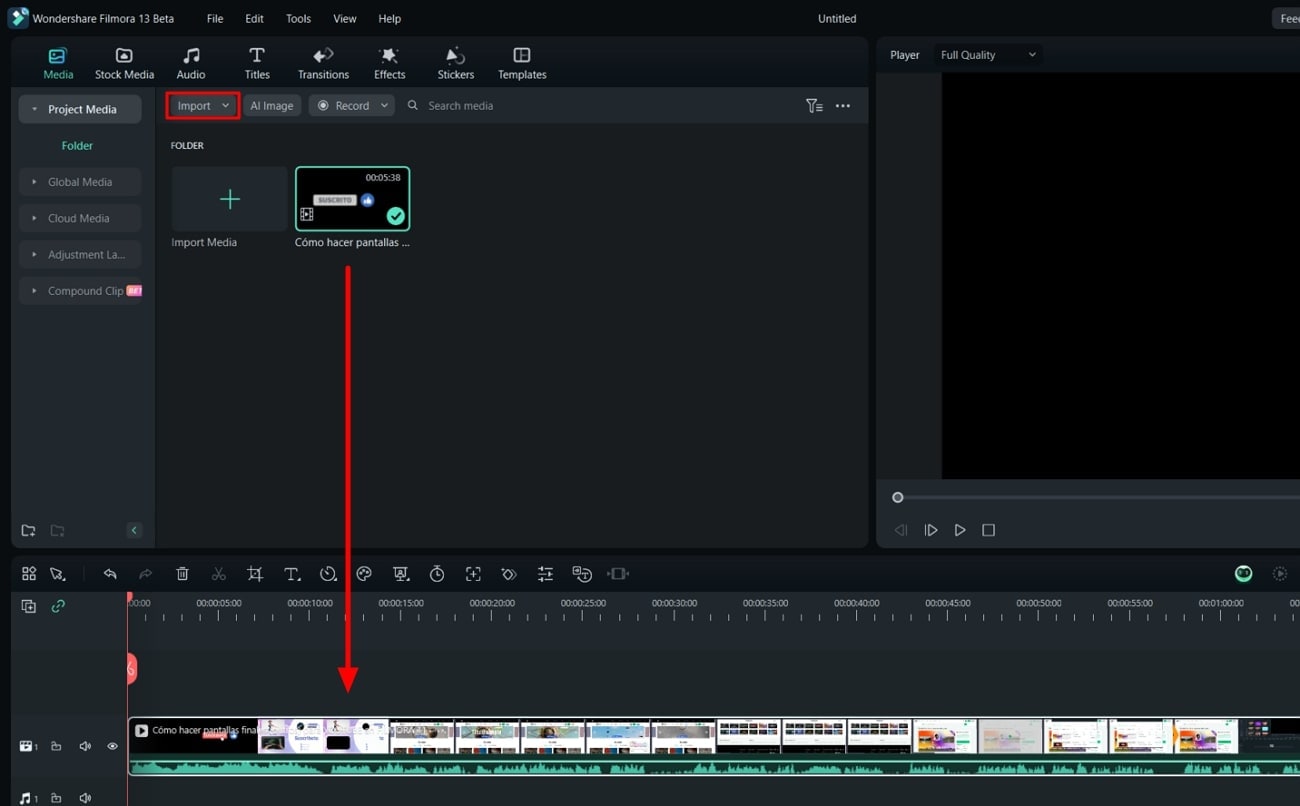
Step 2: Activate Audio Denoise
Once the media is in the timeline, select it and navigate towards the right-side panel. Under the “Audio” tab, locate and expand the “Denoise” option. In this section, enable the “Normal Denoise” button, which will auto-denoise audio. You can also use the “Denoise Level” slider to adjust the intensity of denoise.
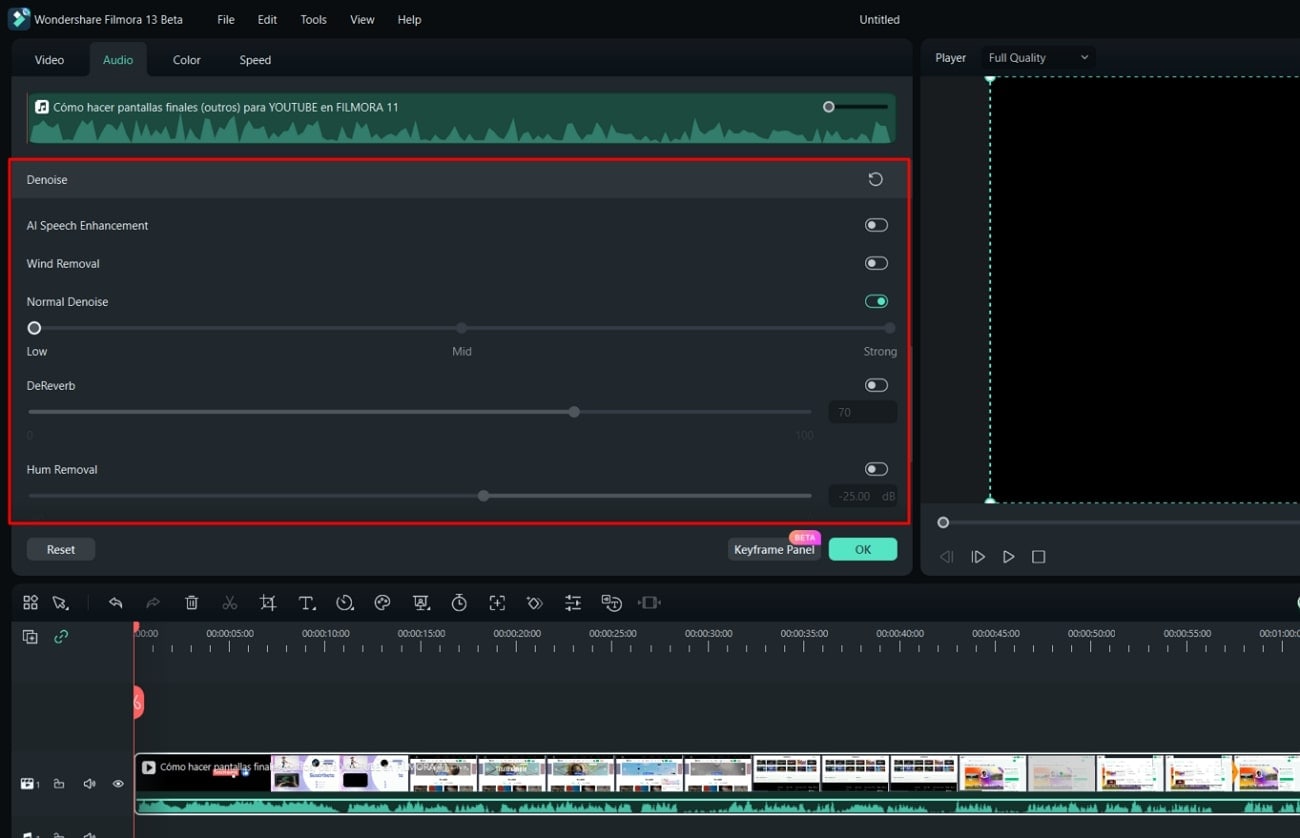
Step 3: Export the Edited File
Once you have made all the changes, click the “Export” button at the top right corner. Further, adjust export settings in the appeared window and click the “Export” button.
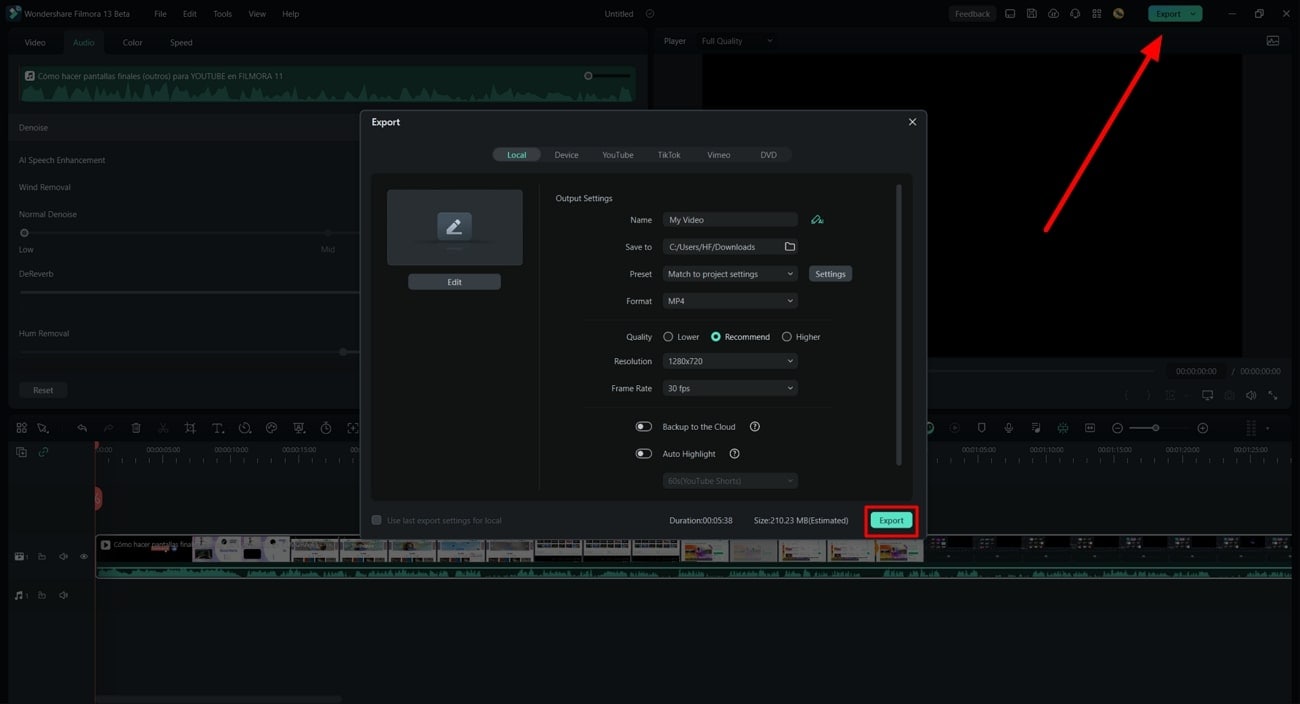
Bonus Tip: Remove Vocals from Audio with Dedicated AI Vocal Remover in Filmora
Other than denoising, you can use Vocal Remover to extract speech from the background. It separates both vocals and background noise. We have crafted the step-by-step procedure to use vocal remover:
Step 1: Start Filmora and Import Video
Begin by installing and launching Wondershare Filmora on your device. Log in and select the “New Project” tab to access Filmora’s editing interface. Next, use the “Import” option to import files from your device. Once imported, simply drag and drop them onto the timeline.
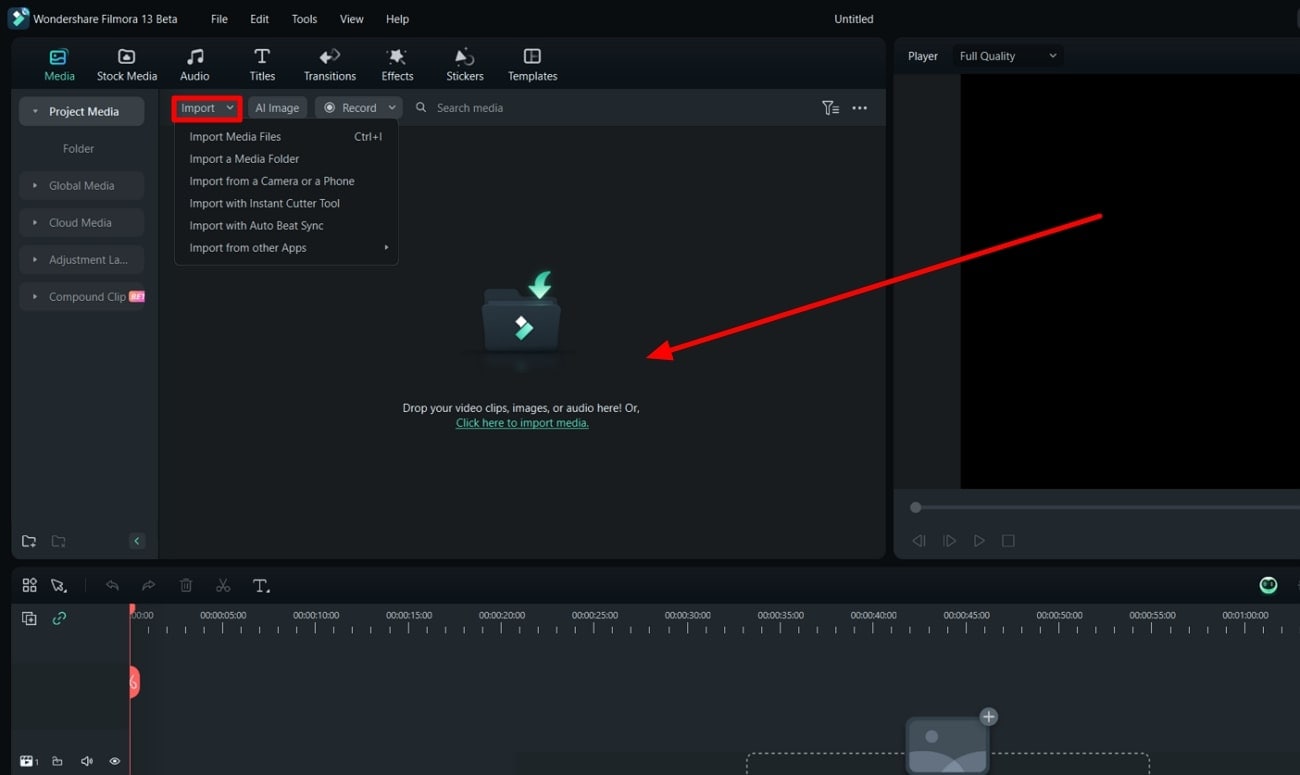
Step 2: Access the AI Vocal Remover
Next, direct towards the timeline panel and right-click on the video in the timeline. From the options menu, select the “AI Vocal Remover” option. The AI will start separating vocals from background audio.
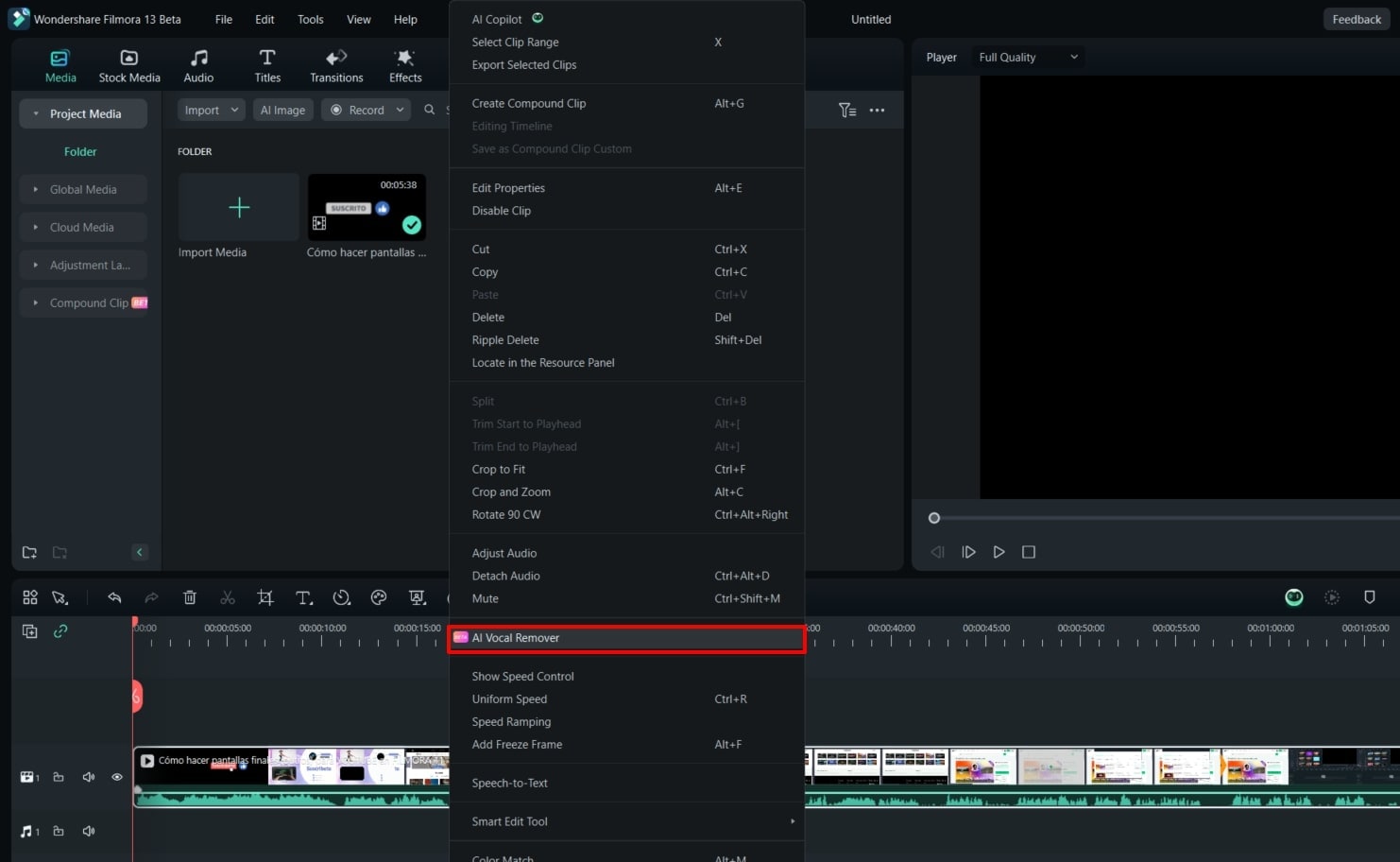
Step 3: Download the AI Processed Video
Once both vocals and background noise are separate, delete the background audio. Then, click the “Export” button to download this file on your device.
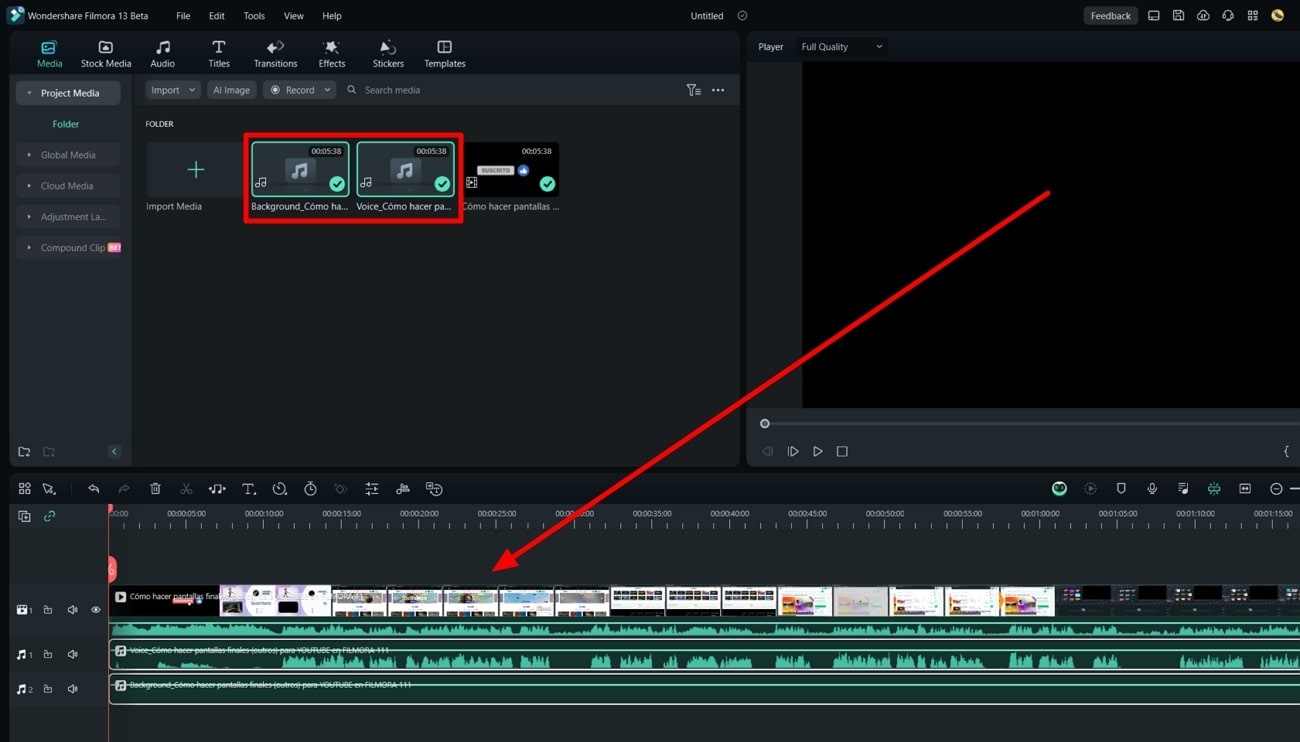
Free Download For Win 7 or later(64-bit)
Free Download For macOS 10.14 or later
Conclusion
After reading this article, users have knowledge of noise reduction in Audition. The article discussed different methods of removing noises in this professional software. Users can employ the web-based Adobe Audition noise reduction alternatives.
If you want a next-level tool for creative editing, then download Wondershare Filmora. The article discussed two methods for enhancing audio content. The software is compatible across multiple platforms to assist all types of users.
Free Download Free Download Learn More

Part 1: What Do You Know About Background Noise?
Background noise is anything that disturbs the pace of the video and diverts the viewer’s attention. It is the unwanted and unintended sound that takes up your audio. This may include someone chatting in the background, wind noise, and other noises. These factors decline and disrupt the clarity of audio. However, these elements can be managed through various tools and techniques to help creators.
Part 2: How to Remove Noise from Adobe Audition: A Comprehensive Review
Adobe Audition is a tool tailored to assist in audio editing tasks with precision. Users can create, merge, and mix different sound effects and be creative with them. It also has seamless support of Adobe After Effects and Adobe Stock for this purpose. Noise reduction Audition is one of its features that helps in cleaning and enhancing audio. It clears out any unnecessary background noises from any project.
In addition, the tool allows you to manage the audio levels for denoising. Along with manual settings, you can also add denoise effects to reduce background effects. You can manage high and low frequencies in Adobe Audition to remove noise. Upon editing this software, you can review the results afterward.
Different Methods of Audio Reduction in Adobe Audition
As a content creator, you must often manage dialogues and music within a video. Combining both can sometimes get the focus off actual dialogues. This can be due to many reasons; however, the solution is noise reduction in Audition. In this section, you can explore different methods to reduce noise:
1. Noise Reduction Effect
In this section, we are doing a noise reduction Audition manually. The process is straightforward, and here is a step-by-step guide to it:
Step 1: Upon importing your audio in Adobe Audition, navigate towards the top toolbar. Select the “Effects” tab and choose “Noise Reduction/Restoration” from the dropdown menu. As the menu expands further, select “Noise Reduction.”

Step 2: This will feature a Noise Reduction window on your screen. In this window, select the “Capture Noise Print” tab and adjust the Noise Reduction slider. Afterwards, press the play button on this window to listen to the audio and select “Apply.”

2. DeNoise Effect
This is the second method of Adobe Audition to remove noise. Accessing this option is almost the same, but settings may vary. Here is an instruction manual on how you can denoise in Audition:
Step 1: Once you have imported media into the timeline, reach the upper toolbar. Look for the “Effects” tab and proceed to the “Noise Reduction/Restoration” settings. From the expansion panel, choose the “DeNoise” option.

Step 2: After accessing the DeNoise window appearing on the screen, direct towards it. Then, change the position of the “Amount” slider and play your audio. Further, select the “Apply” button to add this effect to your audio.

3. Dynamic Effect
Another audio effect that you can apply and adjust in the same manner is the dynamic effect. Follow the steps given below to achieve this effect:
Step 1: After selecting the “Audio” tab, choose “Amplitude and Compression” from the dropdown menu. Expand this option and select “Dynamics” from the expansion menu.

Step 2: From the Dynamics window, expand the “Preset” option and set it to “Default.” Further, activate the “AutoGate” option and change the “Threshold” value. Then, click “Apply” to save and apply these settings.

Part 3: Other Solutions That Can Be Tried to Remove Noise from Videos
Since Adobe Audition remove noise has a professional interface, it might trouble some of you. The settings can be challenging to apply, so this section is all about alternatives. In this section, you can find the online solutions for noise reduction below:
1. Flixier
With this online Adobe Audition remove noise alternative, you can remove background noise. Users simply need to upload a video and activate the enhanced audio option. The audio enhancer eliminates unnecessary sound, giving it a name and description. It is compatible with popular and worldwide media formats like WAV, MP3, etc. Moreover, you can share the video straight to social platforms.

Key Features
- Offers an Improve Quality feature to clear up and enhance speech.
- Users can edit audio after denoising, and you can access its audio library to apply effects.
- Users can detach audio from the clip or fade in and out the audio effects to align with the video.
2. MyEdit
Are you looking for an online AI alternative to Adobe Audition noise reduction? This is a versatile platform for removing unwanted audio from up to 100 MB file size. It can denoise a 10 minutes file of formats like MP3, MP4, WAV, and FLAC. It enhances quality through audio denoise, wind remover, and speech enhancement. It uses AI technology to auto-remove background noise and enables a preview.

Key Features
- Users can employ its Vocal Remover to create clear and high-quality voiceovers.
- The user interface is a simple upload-to-convert process and doesn’t take up any storage.
- The AI helps accelerate the denoise process and retains audio quality.
3. KwiCut
Utilize this web-based Adobe Audition remove noise alternative to eliminate background noises. It can remove anything that declines an audio quality, like hums, hisses, and more. It removes any distractions in the background that decline communication. The AI assists in enhancing speech to maintain the professional element in the continent.

Key Features
- The tool supports a range of audio and video formats like MP3, MOV, WAV, and more.
- It supports text-based audio editing to edit audio or remove secondary noises.
- To create effective voiceovers for videos, use KwiCut’s voice cloning feature.
Part 4: Wondershare Filmora: A Unique Solution to Reducing Noise in Video and Audio Content
In contrast to all these Adobe Audition noise reduction alternatives, here is another. Wondershare Filmora is a wide platform for video, audio, and visual editing. The tool allows users to use manual and AI features to enhance content. In addition, Filmora introduced its V13 upgrade with new AI features. Amongst them is the AI Vocal Remover tool that separates vocals from background noise.
Using this tool can help you embed vocals in video tutorials or vlogs. In addition, Filmora also offers an Audio Denoise feature to remove distracting noises and voices. Users can enhance speech by removing wind noise, humming, and hissing. In addition, you can take Filmora’s Denoise AI’s assistance to do this.
Steps for Filmora AI Audio Denoise
If you wish to employ Filmora’s denoise feature, you are at the right place. This tool enables AI Speech Enhancement and Wind Removal with a denoise option. In addition, it has DeReverb, Hum Removal, and Hiss Removal. Users can manually adjust the value of this slider to set audio preferences. By following this step-by-step guide, users can remove background noises from video:
Free Download For Win 7 or later(64-bit)
Free Download For macOS 10.14 or later
Step 1: Initiate Filmora and Import Media to Timeline
First, download this AI software on your device and launch it. After logging in, locate and hit the “New Project” option and enter its editing interface. Afterward, click the “Ctrl + I” keys and choose files from your device. Once the files are imported, drag and place them in the timeline.

Step 2: Activate Audio Denoise
Once the media is in the timeline, select it and navigate towards the right-side panel. Under the “Audio” tab, locate and expand the “Denoise” option. In this section, enable the “Normal Denoise” button, which will auto-denoise audio. You can also use the “Denoise Level” slider to adjust the intensity of denoise.

Step 3: Export the Edited File
Once you have made all the changes, click the “Export” button at the top right corner. Further, adjust export settings in the appeared window and click the “Export” button.

Bonus Tip: Remove Vocals from Audio with Dedicated AI Vocal Remover in Filmora
Other than denoising, you can use Vocal Remover to extract speech from the background. It separates both vocals and background noise. We have crafted the step-by-step procedure to use vocal remover:
Step 1: Start Filmora and Import Video
Begin by installing and launching Wondershare Filmora on your device. Log in and select the “New Project” tab to access Filmora’s editing interface. Next, use the “Import” option to import files from your device. Once imported, simply drag and drop them onto the timeline.

Step 2: Access the AI Vocal Remover
Next, direct towards the timeline panel and right-click on the video in the timeline. From the options menu, select the “AI Vocal Remover” option. The AI will start separating vocals from background audio.

Step 3: Download the AI Processed Video
Once both vocals and background noise are separate, delete the background audio. Then, click the “Export” button to download this file on your device.

Free Download For Win 7 or later(64-bit)
Free Download For macOS 10.14 or later
Conclusion
After reading this article, users have knowledge of noise reduction in Audition. The article discussed different methods of removing noises in this professional software. Users can employ the web-based Adobe Audition noise reduction alternatives.
If you want a next-level tool for creative editing, then download Wondershare Filmora. The article discussed two methods for enhancing audio content. The software is compatible across multiple platforms to assist all types of users.
“Comprehensive Overview: Discover the Best macOS-Based Music Editors Ranked Top 4 “
A good music editor for your Mac can do everything you need: record voiceover files, cut, delete, insert audio clips, add voice effects, add sound effects, perform a spectrographic analysis, and much more. And why do you need to do those things with a music editor? Some of the most common music editor projects include:
- Find music online and edit to share to phone and other devices
- Trim audio and music files
- Create custom ringtones
- Create and share custom music and audio files
- Add music and sound effects to video files
So how do you choose a music editor for Mac that can do everything you want? In this article, we will share with you some music editors that you can use on Mac computer. Let’s move on.
Section 1. Free Music Editors for Mac
Free-to-use is great, especially when you get all the performance and features you need in a music editor. Two free music and audio editors for Mac we recommend are:
1. Audio Editor: OcenAudio
OcenAudio has a very extensive toolkit of audio editing capabilities and tools. Still, one of its best features is that it’s easy on your memory: you can edit even very large files without requiring external memory resources.
OcenAudio supports MP3, WAV, FLAC, WMA, and many other audio formats.
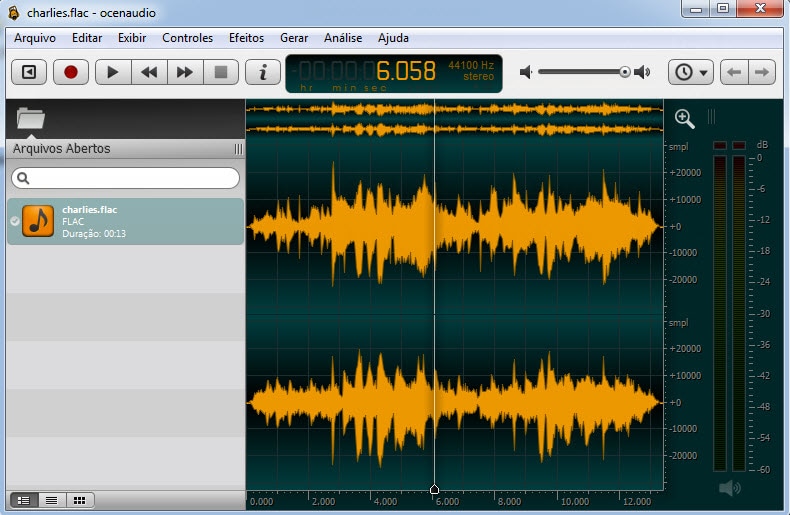
2. MP3 Editor: Audacity
Audacity is free and also has to go for it, a simple and intuitive interface that is easy for beginners. It also has a surprisingly extensive list of features, options, and effects, including spectrographic analysis, undo/redo function, and more.
Audacity supports many formats, including WAV, AIFF, FLAC, MP2, MP3, and OGG.
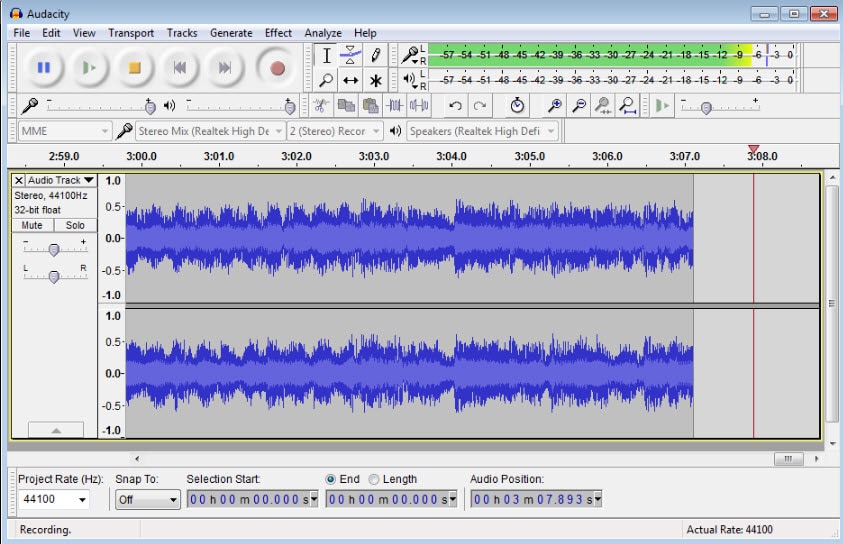
Section 2. Professional Quality Music Editors for Mac
Pay music editing programs for Mac offer a serious boost in performance and an increased number of supported formats and output options.
Two pay music and audio editors for Mac we recommend are:
3. Music Editor: Wondershare Filmora Video & Audio Editor for Mac [Free]
Wondershare Filmora Video & Audio Editor for Mac is often aimed at users who want to edit videos, but this program also offers professional quality performance for editing music and audio. Novice users will appreciate the price and the intuitive interface that allows a gentle learning curve.
Advanced users will like the extensive features and supported formats, including a music library feature. It has slightly fewer features and supported formats than Adobe Audition, but if you don’t need those extra bells and whistles, this is the music editor for Mac for you.
For Win 7 or later (64-bit)
For macOS 10.12 or later
If you are using a windows, check this tutorial instead: Windows Video Editing Software .
4. Sound Editor: Adobe Audition
Adobe Audition comes with a high price at $20/mo. However, users who demand the best will find the cost worth it for a license. It has the most extensive audio and music editing toolset, and it supports the widest range of formats.
A complete range of tutorials also supports adobe Audition to help you get the most from your investment. The fact it takes a while to work through the tutorials and get up to speed might be the only drawback.

Section 3. How to choose Music Editor for Mac users?
Choosing a music editor for Mac, including the ability to edit and output to MP3 and MP4 formats, depends entirely on your needs. If your needs are modest and limited features or functionality work for you, several free-to-use options will get the job done. If you need more robust functionality and professional quality, a pay program will offer more satisfying performance. Keep in mind the following questions when making your choice:
- How often do I need to edit music and audio?
- Do I need simple trim and edit features, or also audio effects?
- What formats are my source files, and what formats do I want to output to?
- What is my budget, and how can I balance performance and price?
With Filmora, you can edit music and audio files with ease. Besides basic cutting features, you can apply fade-in and fade-out effects, adjust the audio volume. What’s more, you can remove the background noise in the audio to get a clear sound.
Versatile Video Editor - Wondershare Filmora
An easy yet powerful editor
Numerous effects to choose from
Detailed tutorials provided by the official channel
So how do you choose a music editor for Mac that can do everything you want? In this article, we will share with you some music editors that you can use on Mac computer. Let’s move on.
Section 1. Free Music Editors for Mac
Free-to-use is great, especially when you get all the performance and features you need in a music editor. Two free music and audio editors for Mac we recommend are:
1. Audio Editor: OcenAudio
OcenAudio has a very extensive toolkit of audio editing capabilities and tools. Still, one of its best features is that it’s easy on your memory: you can edit even very large files without requiring external memory resources.
OcenAudio supports MP3, WAV, FLAC, WMA, and many other audio formats.

2. MP3 Editor: Audacity
Audacity is free and also has to go for it, a simple and intuitive interface that is easy for beginners. It also has a surprisingly extensive list of features, options, and effects, including spectrographic analysis, undo/redo function, and more.
Audacity supports many formats, including WAV, AIFF, FLAC, MP2, MP3, and OGG.

Section 2. Professional Quality Music Editors for Mac
Pay music editing programs for Mac offer a serious boost in performance and an increased number of supported formats and output options.
Two pay music and audio editors for Mac we recommend are:
3. Music Editor: Wondershare Filmora Video & Audio Editor for Mac [Free]
Wondershare Filmora Video & Audio Editor for Mac is often aimed at users who want to edit videos, but this program also offers professional quality performance for editing music and audio. Novice users will appreciate the price and the intuitive interface that allows a gentle learning curve.
Advanced users will like the extensive features and supported formats, including a music library feature. It has slightly fewer features and supported formats than Adobe Audition, but if you don’t need those extra bells and whistles, this is the music editor for Mac for you.
For Win 7 or later (64-bit)
For macOS 10.12 or later
If you are using a windows, check this tutorial instead: Windows Video Editing Software .
4. Sound Editor: Adobe Audition
Adobe Audition comes with a high price at $20/mo. However, users who demand the best will find the cost worth it for a license. It has the most extensive audio and music editing toolset, and it supports the widest range of formats.
A complete range of tutorials also supports adobe Audition to help you get the most from your investment. The fact it takes a while to work through the tutorials and get up to speed might be the only drawback.

Section 3. How to choose Music Editor for Mac users?
Choosing a music editor for Mac, including the ability to edit and output to MP3 and MP4 formats, depends entirely on your needs. If your needs are modest and limited features or functionality work for you, several free-to-use options will get the job done. If you need more robust functionality and professional quality, a pay program will offer more satisfying performance. Keep in mind the following questions when making your choice:
- How often do I need to edit music and audio?
- Do I need simple trim and edit features, or also audio effects?
- What formats are my source files, and what formats do I want to output to?
- What is my budget, and how can I balance performance and price?
With Filmora, you can edit music and audio files with ease. Besides basic cutting features, you can apply fade-in and fade-out effects, adjust the audio volume. What’s more, you can remove the background noise in the audio to get a clear sound.
Versatile Video Editor - Wondershare Filmora
An easy yet powerful editor
Numerous effects to choose from
Detailed tutorials provided by the official channel
So how do you choose a music editor for Mac that can do everything you want? In this article, we will share with you some music editors that you can use on Mac computer. Let’s move on.
Section 1. Free Music Editors for Mac
Free-to-use is great, especially when you get all the performance and features you need in a music editor. Two free music and audio editors for Mac we recommend are:
1. Audio Editor: OcenAudio
OcenAudio has a very extensive toolkit of audio editing capabilities and tools. Still, one of its best features is that it’s easy on your memory: you can edit even very large files without requiring external memory resources.
OcenAudio supports MP3, WAV, FLAC, WMA, and many other audio formats.

2. MP3 Editor: Audacity
Audacity is free and also has to go for it, a simple and intuitive interface that is easy for beginners. It also has a surprisingly extensive list of features, options, and effects, including spectrographic analysis, undo/redo function, and more.
Audacity supports many formats, including WAV, AIFF, FLAC, MP2, MP3, and OGG.

Section 2. Professional Quality Music Editors for Mac
Pay music editing programs for Mac offer a serious boost in performance and an increased number of supported formats and output options.
Two pay music and audio editors for Mac we recommend are:
3. Music Editor: Wondershare Filmora Video & Audio Editor for Mac [Free]
Wondershare Filmora Video & Audio Editor for Mac is often aimed at users who want to edit videos, but this program also offers professional quality performance for editing music and audio. Novice users will appreciate the price and the intuitive interface that allows a gentle learning curve.
Advanced users will like the extensive features and supported formats, including a music library feature. It has slightly fewer features and supported formats than Adobe Audition, but if you don’t need those extra bells and whistles, this is the music editor for Mac for you.
For Win 7 or later (64-bit)
For macOS 10.12 or later
If you are using a windows, check this tutorial instead: Windows Video Editing Software .
4. Sound Editor: Adobe Audition
Adobe Audition comes with a high price at $20/mo. However, users who demand the best will find the cost worth it for a license. It has the most extensive audio and music editing toolset, and it supports the widest range of formats.
A complete range of tutorials also supports adobe Audition to help you get the most from your investment. The fact it takes a while to work through the tutorials and get up to speed might be the only drawback.

Section 3. How to choose Music Editor for Mac users?
Choosing a music editor for Mac, including the ability to edit and output to MP3 and MP4 formats, depends entirely on your needs. If your needs are modest and limited features or functionality work for you, several free-to-use options will get the job done. If you need more robust functionality and professional quality, a pay program will offer more satisfying performance. Keep in mind the following questions when making your choice:
- How often do I need to edit music and audio?
- Do I need simple trim and edit features, or also audio effects?
- What formats are my source files, and what formats do I want to output to?
- What is my budget, and how can I balance performance and price?
With Filmora, you can edit music and audio files with ease. Besides basic cutting features, you can apply fade-in and fade-out effects, adjust the audio volume. What’s more, you can remove the background noise in the audio to get a clear sound.
Versatile Video Editor - Wondershare Filmora
An easy yet powerful editor
Numerous effects to choose from
Detailed tutorials provided by the official channel
So how do you choose a music editor for Mac that can do everything you want? In this article, we will share with you some music editors that you can use on Mac computer. Let’s move on.
Section 1. Free Music Editors for Mac
Free-to-use is great, especially when you get all the performance and features you need in a music editor. Two free music and audio editors for Mac we recommend are:
1. Audio Editor: OcenAudio
OcenAudio has a very extensive toolkit of audio editing capabilities and tools. Still, one of its best features is that it’s easy on your memory: you can edit even very large files without requiring external memory resources.
OcenAudio supports MP3, WAV, FLAC, WMA, and many other audio formats.

2. MP3 Editor: Audacity
Audacity is free and also has to go for it, a simple and intuitive interface that is easy for beginners. It also has a surprisingly extensive list of features, options, and effects, including spectrographic analysis, undo/redo function, and more.
Audacity supports many formats, including WAV, AIFF, FLAC, MP2, MP3, and OGG.

Section 2. Professional Quality Music Editors for Mac
Pay music editing programs for Mac offer a serious boost in performance and an increased number of supported formats and output options.
Two pay music and audio editors for Mac we recommend are:
3. Music Editor: Wondershare Filmora Video & Audio Editor for Mac [Free]
Wondershare Filmora Video & Audio Editor for Mac is often aimed at users who want to edit videos, but this program also offers professional quality performance for editing music and audio. Novice users will appreciate the price and the intuitive interface that allows a gentle learning curve.
Advanced users will like the extensive features and supported formats, including a music library feature. It has slightly fewer features and supported formats than Adobe Audition, but if you don’t need those extra bells and whistles, this is the music editor for Mac for you.
For Win 7 or later (64-bit)
For macOS 10.12 or later
If you are using a windows, check this tutorial instead: Windows Video Editing Software .
4. Sound Editor: Adobe Audition
Adobe Audition comes with a high price at $20/mo. However, users who demand the best will find the cost worth it for a license. It has the most extensive audio and music editing toolset, and it supports the widest range of formats.
A complete range of tutorials also supports adobe Audition to help you get the most from your investment. The fact it takes a while to work through the tutorials and get up to speed might be the only drawback.

Section 3. How to choose Music Editor for Mac users?
Choosing a music editor for Mac, including the ability to edit and output to MP3 and MP4 formats, depends entirely on your needs. If your needs are modest and limited features or functionality work for you, several free-to-use options will get the job done. If you need more robust functionality and professional quality, a pay program will offer more satisfying performance. Keep in mind the following questions when making your choice:
- How often do I need to edit music and audio?
- Do I need simple trim and edit features, or also audio effects?
- What formats are my source files, and what formats do I want to output to?
- What is my budget, and how can I balance performance and price?
With Filmora, you can edit music and audio files with ease. Besides basic cutting features, you can apply fade-in and fade-out effects, adjust the audio volume. What’s more, you can remove the background noise in the audio to get a clear sound.
Versatile Video Editor - Wondershare Filmora
An easy yet powerful editor
Numerous effects to choose from
Detailed tutorials provided by the official channel
Mastering MP3 Metadata: The Five Highest-Rated Tag Editors You Should Try
Do you like songs? Generally, people love and enjoy listening to songs because it relaxes them. Some people work with music, some study with music, whereas some go to the gym and sweat on the beats. The question is, do you just enjoy the music or do you get proper knowledge about it?
ID3 tags are the metadata in MP3 files which contain information regarding the content like its title, artist, album, genre, and other things. In case you want to change the tags, you can take help from the online MP3 tag editors. Let us discuss the 5 best tag editors that could be used.
Part 1. 5 Best Online MP3 Tag Editor Websites That You Can’t Miss
There are two types of music lovers, one who just listens to enjoy. Whereas others like to collect music and maintain a tag library. MP3 files have metadata, and this consists of information regarding the music file other than its name. Do you know the MP3 tag is the best business? Let’s talk more about it and share 5 great music tag editors online.
1. TagMP3.net
TagMP3.net is a free website for changing music tags, album arts, and other ID3 as well. With this website, you don’t have to download or install any software or application to change the ID3 tags of your MP3 files. A cool thing about TagMP3.net is that it can be accessed from any platform regardless of the device being used. You only need a strong internet connection to use the online editor.
This online automatic MP3 tag editor updates the ID3 version to ID3v2 for the MP3 files. This editor comes with a very easy and user-friendly interface, and you don’t need much assistance to use it. With TagMP3.net, you can easily upload the audio file from your hard drive, or else for uploading a file from an online database, enter its URL.
How to Use TagMP3.net?
Step 1: Start by searching and opening the TagMP3.net editing tool on your browser. Then you have to upload the files for that, hit the ‘Choose Files’ button and add the file. Or else, you can also copy-paste the URL or drag and drop the file.

Step 2: Now, the music tag editor online will spontaneously add the metadata found on the internet. You can then check and verify the added information and make changes if required.

Step 3: After all the data is finalized, you can tap on the ‘Generate New File’ button. As soon as you do this, you are redirected to the ‘Download’ page. At this point, download the copy of the audio file that contains the correct metadata.

2. MP3Repair
MP3Repair is an online MP3 tag editor with many other diverse features. Apart from editing MP3 tags, the tool could also be used for repairing online audio lengths and playtimes, cutting MP3 files and removing advertising, etc.
MP3Repair is a freeware, online editor that allows both repair and edit of MP3 files uploaded from your device or else from an online database. This online tool has a clean and understandable interface that users can work with easily.
Guideline to Use MP3Repair
Step 1: Open the web browser on your device and search for MP3Repair, then open its official webpage to start the work. After that, upload the MP3 file by pasting the URL to get the file from an online database. Or, hit the big ‘Upload’ button to add files from your device.

Step 2: After the file has been added, tap on the ‘Upload MP3 File’ button. Now, among the provided options, select the ‘Edit ID3 Tags’ option. All the detailed information will appear on the screen; from here, edit the metadata and tap on the ‘Repair/Edit your MP3 File Now!’ option.

Step 3: Lastly, when the repaired MP3 file is displayed on the screen, hit the ‘Download your new MP3 File’ button. This will automatically download the MP3 file with the edited ID3 tags.

3. Watermark Images
Looking for a tool to add metadata? Let’s talk about Watermark Images. This online tool is free to use for unlimited time. You can add metadata to any of your files like images, audio, etc. The best part about using Watermark Images music tag editor online is that it offers an active customer service help center.
Moreover, this online freeware tool supports you to add or change the album artwork. This easy-to-use tool has no requirements to download anything on your machine; you just need good internet connectivity.
Follow these Steps to Use Watermark Image MP3 Tag Editor
Step 1: To use Watermark Images online MP3 tag editor; first of all, browse for its official webpage. As soon as it opens, hit the ‘Select MP3 File’ button and select your preferred file to add metadata; it takes a few seconds to upload the file.

Step 2: Next to the ‘MP3 output settings’ section, you will see a long list of empty fields asking for genre names, artists, etc. Here, search for all the asked questions and then enter them in the empty fields. After that, tap on the ‘Process MP3’ button below the details to add the information in the MP3 file.

Step 3: At the end, click on the ‘Download File’ button. This will insert all the metadata and information regarding the audio file, and lastly, a link will be shared to download the final file.

4. MP3 ID3 Tag Editor
Are you a beginner? Try MP3 ID3 Tag Editor for adding and editing tags in your MP3 files. This tool is very useful and simple because of its easy interface. Your audio files can be edited like compressing, album title, album artist, genre, etc.
With MP3 ID3 Tag Editor, you can either add or also change the album art. Moreover, the online automatic MP3 tag editor extends support to auto-fill bags. The best thing, save your files to Google Drive or your computer with this tag editor.
Use MP3 ID3 Tag Editor by Following these Steps
Step 1: For editing the metadata in any MP3 file, start by opening the webpage of the tag editor. Next, you have to upload the file, for that either import file from the available cloud storages options. Or else, tap on the ‘Choose Files’ option to browse the file from your device.

Step 2: As soon as you have uploaded the file, the screen will display different options and various fields. You should fill out the form and update the metadata.

Step 3: After all the amendments are made in the metadata, tap on the ‘Save Tags’ option to save the file to your computer or Google Drive.

5. NeatMP3
If we talk about another nice tag editor, then, NeatMP3 is on the list. This online tool provides you with complete assistance, and you simply have to search for the metadata and fill in the correct spaces. This online automatic MP3 tag editor has a free version, and a premium version is also available. Are you ready to know about the most amazing thing? The offline version of this tool comes with a built-in media player.
Learn From Us to Use NeatMP3
Step 1: To edit the tags, first of all, search for the official website of ‘NeatMP3’ on any browser on your computer. Next, for uploading the MP3 file, tap on the ‘Choose File’ option from the webpage.

Step 2: We have mentioned this earlier; this online MP3 tag editor does not automatically fill the metadata. Users have to fill out the form after searching for the information manually. After filling out the information, tap on the ‘Write Tags’ button and download the MP3 file.

Last Words
Was the above article helpful? Like we said earlier, we will introduce the 5 best online MP3 tag editors, so we did that. We hope that the article has shared a sufficient level of detail to increase your knowledge. Talking about increasing your knowledge, let’s also introduce a great video editor.
We are talking about Wondershare Filmora . This editor offers a wide variety of tools and diverse features. You can edit videos, audio, and a lot more than that. Features like Split Screen, Stabilize Video, AI Portrait, etc., are not a big deal for Filmora.
Apart from advanced features, you can also get your hands-on basic editing features like trim, cut, split, merge, join, etc.
For Win 7 or later (64-bit)
For macOS 10.12 or later
For macOS 10.12 or later
For macOS 10.12 or later
For macOS 10.12 or later
Also read:
- [Updated] Tech-Savvy Tips to Ensure Perfect Call Recording on FaceTime for 2024
- [Updated] The Ultimate Instagram Captioning Hack for Reels and Stories for 2024
- A Step-by-Step Guide on Using ADB and Fastboot to Remove FRP Lock on your Vivo S18
- In 2024, Complete Tutorial to Use GPS Joystick to Fake GPS Location On Lava Yuva 3 | Dr.fone
- In 2024, Elevate Your Social Media Presence Top 25 Hashtags for Instagram Mastery
- In 2024, Expert Choice Leading Tools for Online YTVideo Conversion
- In 2024, Explore Cost-Free, Professional Cam Screen Recorders
- In 2024, How Do You Get Sun Stone Evolutions in Pokémon For Oppo A78? | Dr.fone
- Mastering Your Sound on the Go Best iOS Apps for Editing, 2023 Edition
- New 2024 Approved Detailed Tutorial Shifting Audio Tracks Within Multimedia Files
- New 2024 Approved Voice Cloning Simplified Two Approaches to Achieve Consistent AI Voices
- New Harmonic Splitters Easy-to-Employ Perfect for Newcomers & Professionals Alike for 2024
- New How to Put Music Over a Video for 2024
- New In 2024, Omegle Exclusion No More Strategies for Removal From the Blacklist
- New In 2024, Sound Extractor How to Extract Sound From Video?
- New The Future of Audio Fabrication Creating Convincing AI Voices Through Advanced Techniques for 2024
- What Is a SIM Network Unlock PIN? Get Your Motorola Moto G34 5G Phone Network-Ready
- Title: Removing Noise From Music Using Adobe Audition Reviewing All Possibilities
- Author: David
- Created at : 2024-10-16 23:46:08
- Updated at : 2024-10-17 20:13:59
- Link: https://sound-tweaking.techidaily.com/removing-noise-from-music-using-adobe-audition-reviewing-all-possibilities/
- License: This work is licensed under CC BY-NC-SA 4.0.
